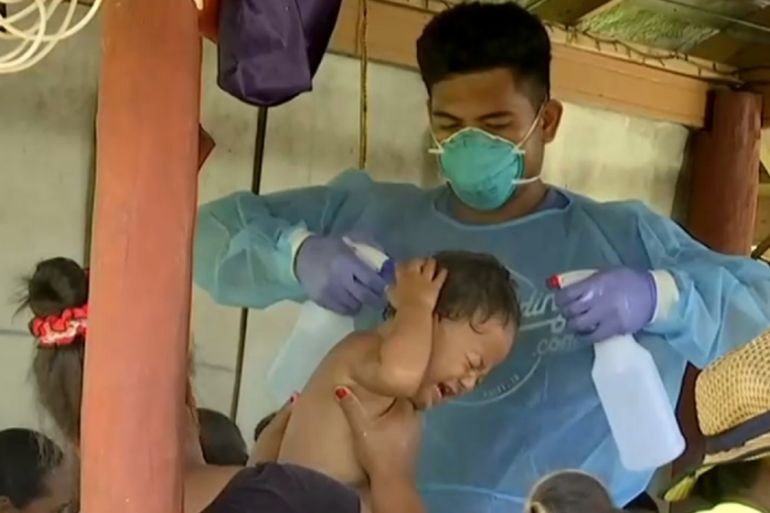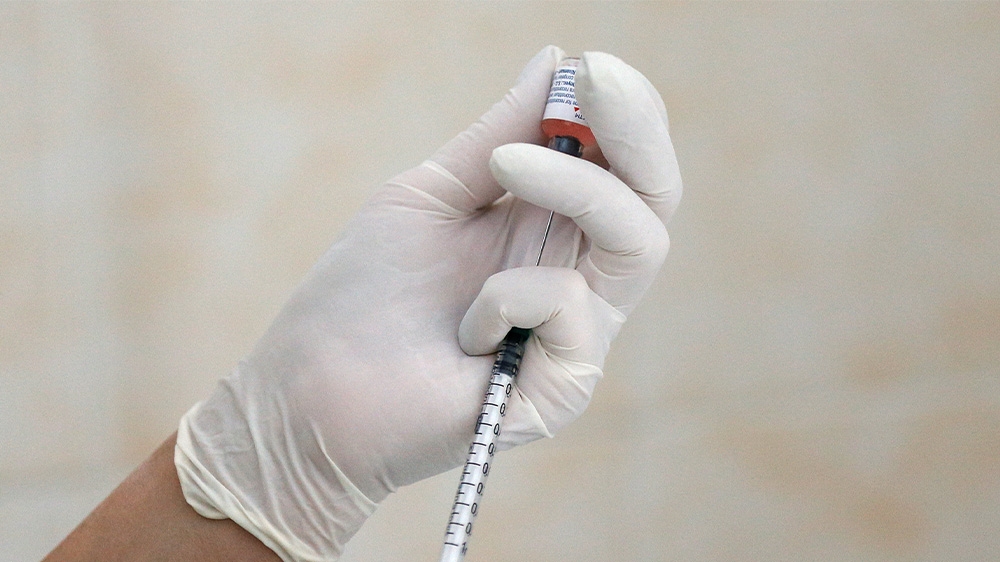Unvaccinated to show red flags as Samoa battles measles epidemic
Official data released on Wednesday put death toll from outbreak at 60, with 171 new cases reported in one day.

Authorities in Samoa have asked unvaccinated families to display a red flag outside their homes on Wednesday to help a mass immunisation drive aimed at halting a measles epidemic that has killed at least 60 people, most of them children.
The tiny Pacific nation of 200,000 will grind to a halt on Thursday and Friday as non-essential government services close to enable public servants to help with the vaccination campaign.
Keep reading
list of 3 itemsSamoa makes measles vaccine mandatory to stop deadly outbreak
Measles cases triple around the world, WHO warns
Over the two days, teams will go door-to-door administering vaccines in a desperate bid to raise the low immunity levels in Samoa that have fuelled the epidemic.
Immunisation is compulsory under a state of emergency imposed last month and officials asked unvaccinated families to identify themselves.
“The public is hereby advised to tie a red cloth or red flag in front of their houses and near the road to indicate that family members have not been vaccinated,” a public advisory said.
“The red mark makes it easier for the teams to identify households for vaccinations.”
Al Jazeera’s Jessica Washington, reporting from the Samoa capital Apia, said that it seemed the government was changing its strategy in dealing with the epidemic, as the death toll continued to rise.
While most of the infections are contained in urban areas, health officials will fan out across the country to determine which areas still need more attention, Washington said.
Official data released on Wednesday put the death toll from the outbreak at 60, up five from the previous day.
Most of the dead are children, with 52 of them aged four or under.
Infection rates continued to climb this week, with 171 new cases in 24 hours, bringing the national total to 4,052, according to the latest report on Wednesday.
Across #Samoa, people queue for the measles vaccine – 60 people have died (most of them children under 4) since the outbreak began in October. #SamoaMeasles @AJEnglish pic.twitter.com/lL9wkOWJbH
— Jessica Washington (@JesWashington) December 4, 2019
As infections rise in Samoa, the World Health Organization (WHO) has warned of a “slide back” in global efforts to eliminate the disease.
The organisation’s medical officer for the western Pacific, Jose Hagan, said it was a grim reminder of the danger posed by the disease.
“Unfortunately the case (to) fatality rate of measles is much higher than people realise,” he told Radio New Zealand.
“This is quite a severe disease and we just aren’t used to seeing it, so it comes as quite a surprise when we see how fatal it can be.”
Misinformation on vaccines
He said the death rate in Samoa was less than 2 percent but had been known to reach 5 percent in developing countries.
Hagen said increased access to measles vaccines was estimated to have saved 21 million lives over the past 20 years.

“But we are starting to have a slide back and there are outbreaks happening all over the world in all WHO regions and it’s leading to the virus being exported through international travel,” he said.
Cases have skyrocketed in Europe, leading to Britain, Greece, the Czech Republic and Albania all losing their measles-free status in August.
The United States narrowly maintained its “measles eliminated” status a few months later, despite experiencing its worst outbreak since 1992.
The WHO has pointed to various reasons for declining immunisation rates including lack of access to healthcare and complacency about the need to vaccinate.
Misinformation about immunisation from anti-vaccine campaigners has also driven the spread of the disease, according to the WHO.
Samoa’s Prime Minister Tuilaepa Sailele Malielegaoi this week said vaccination was the only answer to the epidemic, and has broadened its vaccination programme in recent weeks to include the entire population.
Samoa has received assistance from a number of countries including Australia, New Zealand, China, Japan and the US.